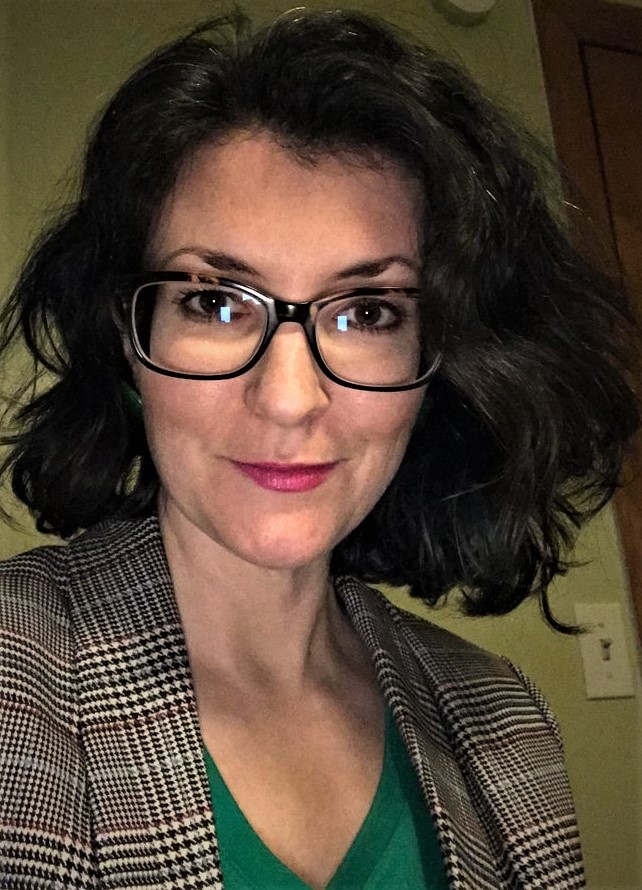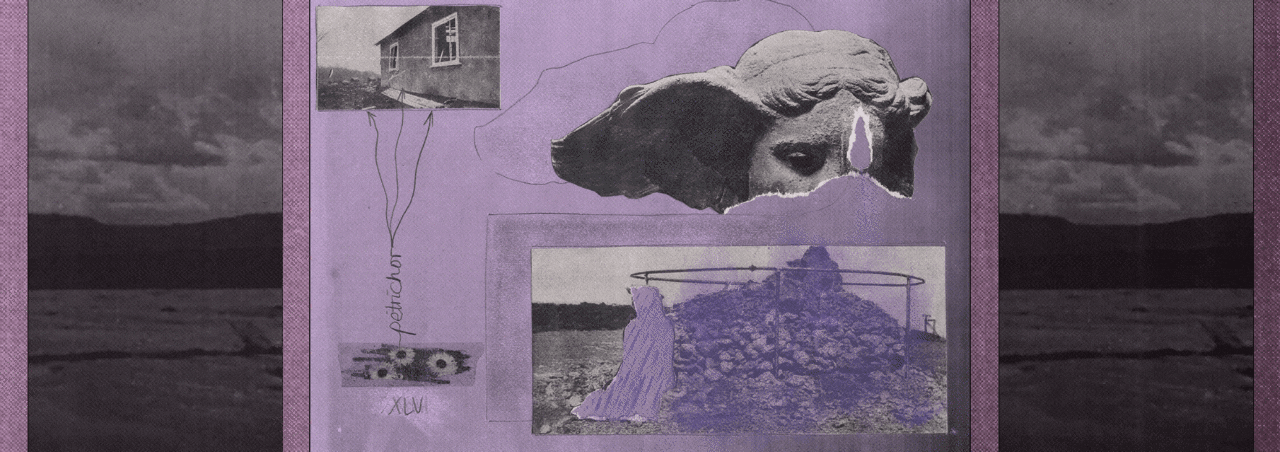
by Jen Hudgens
Rebecca Cuthbert is a dark fiction and poetry writer living in Western New York. She loves ghost stories, folklore, witchy women, and anything that involves nature getting revenge. Rebecca, thank you for allowing me to read your first poetry collection, In Memory of Exoskeletons.
JH: In the poem Turnkey, the first stanza made me pause. The poem creeps across the page much like my own understanding of grief. What inspired you to start the collection with the poem Turnkey? Did you have an intention for a particular audience? Did you have any expectations of how this first poem would pull your reader into the rest of the collection? I’m curious as to your intentions vs how it might resonate with someone who has little to no experience with loss/grief.
RC: I started off with “Turnkey” because that poem is about beginnings–except not quite. Every new start is haunted by the ghosts of what came before it, and people bring their own histories along with them. Buying our house and moving into it was just layering our lives onto the life the house had already lived, and the people who built it and made it their home. Sometimes that was comforting. Other times it felt crowded.
I don’t think I know anyone who hasn’t experienced loss, grief, trauma–something they hold within themselves that hurts. Some people bury it deeper than others. My hope with this collection is to tap into those feelings, buried or not, and bring them closer to the surface. Maybe that will make them hurt less.
JH: Can you tell me a little bit about how your collection engages with the ways in which we allow our own memories to haunt us? Even the subtle, small ones. Do you feel like our legacy can be left to bits of kitsch and sentimentality? What kind of legacy do you hope to leave?
RC: I’m at a point in my life where I don’t want to run from hard things anymore. Like that old saying about skeletons in the closet–I’ve been letting mine out. Propping them up on the couch.
I love thrift stores and estate sales. But when I find little treasures I know they are someone else’s memories. My mother’s cookie cutters mean something to me because I remember baking cookies with her and my siblings when I was a little kid. But once those memories end–when I’m gone, too–those cookie cutters won’t be anything important for my nieces or nephews to keep (unless we start baking together, and the cookie cutters become a link to me). So the answer is yes–our legacy can be left with things like cookie cutters, but it’s temporary.
As for my own legacy, I hope my friends and loved ones will remember me fondly when they see things that bring me to mind. Beyond them, I have no hopes or expectations. To anyone else I’ll be an anonymous dead person.
JH: When was the last time you created something with no intention of completing it, just to make something? What did it feel like?
RC: For this I’ll leave writing behind and go to gardening. A garden is never done. There will always be things to cut back and rearrange and pull out. Seeds to plant. Weeds to yank. A lot of what I try in the garden fails. But trying is the fun part. You’re not supposed to finish a garden.
JH: I love the moments of quiet discovery in many of these poems. I’m a sucker for the ways in which subtle though striking imagery allows the reader to experience the work without spoon-feeding the messages. Can you please tell me a little bit about your choice of structure, line breaks, etc. What’s your process in writing and editing a poem? What inspired this collection in the first place?
RC: I want to say I am not a “formally trained” poet. I don’t write literary poetry. I just have fun playing around with words and syntax and rhythm. But as a creative writing teacher, I know that imagery is the most important element of any poem. Without it, readers are lost. There’s no connection. But I also pay close attention to pacing. Is the poem a steady march or a frantic dash? A slow creep? Some poems change pace–speed up or slow down. And pacing is determined by the length of lines, the syllable count of single words and word groupings, the punctuation used, spacing (vertical or horizontal), and even letters and clusters of letters. Each word has to be intentional. Poetry is interesting that way–it’s all so granular.
JH: What’s the best piece of writing advice you ever received?
RC: I’ve gotten so much good advice and read so much good advice over the years that it’s hard to say. But at a conference, a speaker said that when you write, in any genre, any classification, “Don’t bore. Don’t confuse.” And I keep it in mind all the time. I’m not saying I always get it right–those things are subjective, after all–but I strive to keep my work from being boring or confusing.
JH: I know you have some horror projects out and in the works, can you tell me a bit more about those? Where can folks find you on social media? Where can they read and purchase more of your amazing work?
RC: I’m excited about a lot of things. This month, I have a new book coming out–a combination of memoir and craft text called Creep This Way: How to Become a Horror Writer with 24 Tips to Get You Ghouling, from Seamus & Nunzio Productions. In the fall, my hybrid poetry and fiction collection, Self-Made Monsters, will be out from Alien Buddha Press (with an introduction by Laurel Hightower). I also have a children’s horror picture book scheduled for this year, though things aren’t finalized yet. Additional titles are coming out in 2025, and I’m working on a novel and a second poetry collection. Recently I was invited to become the editor-in-chief of PsychoToxin PINK, a feminist horror imprint of PsychoToxin Press. I’m hoping to be able to keep my energy level up for all of this, but I’ve worn myself down a couple times this year and gotten sick, so I need to be careful. I have a couple of fun trips planned, too–a writing workshop in West Virginia in March, AuthorCon III in April, and maybe a reading-focused trip in November. If I can pull it all off, the year will be pretty incredible. Fingers crossed.
< BACK INDEX